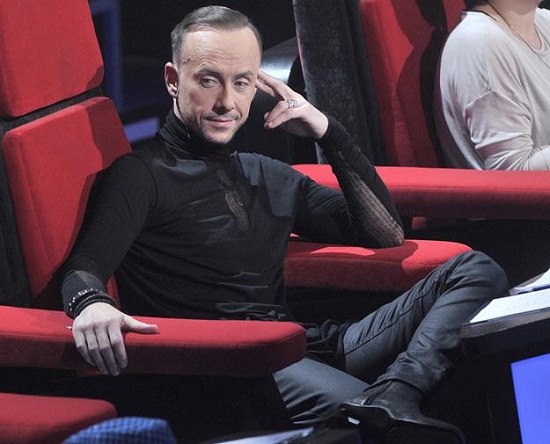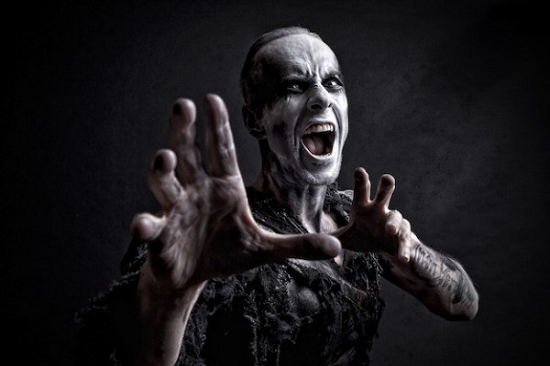Music and religion have shared a close relationship for Adam ‘Nergal’ Darski ever since he bought his first electric guitar with money he was given for his first communion. The now infamous Bible-ripping incident at a 2007 gig in Darski’s home town of Gdynia cemented this relationship in the public imagination and has dogged the Behemoth frontman for years. Dragged through the courts on the basis of an anachronistic blasphemy law, Darksi was only finally cleared of all offences in the Polish Supreme Court earlier this month. His compelling confrontation of his 2010 leukaemia diagnosis as a literal battle – ‘It was not a hospital, but more a front line’, he explains – as well as his appearance as a judge on TV talent show The Voice of Poland, provoking antagonists from the Polish Catholic Church and right wing populist Law and Justice Party to threaten a licence fee strike over the appearance of this ‘Satanist’ on publicly-funded television, has seen Darski become a personality of interest far beyond the boundaries of metal culture. Now, in a book that sets him up as a kind of Renaissance man, the notoriously opinionated Darski gets the chance to lay out his philosophy on celebrity, religion, history, Polishness, life and near death in full. Taking an ‘in conversation’ format, and translated from the 2012 Polish original which won a place on Polish book chain Empik’s bestseller list, the book confirms Darski’s image as a serious and unique character who has more to offer than just his music.
To the Anglophone reader, Confessions of a Heretic jars in some ways, lacking as it does a cast of characters list (mentions of a host of unfamiliar Polish celebrities lack meaning without context), and explanation of some idioms – ‘like chives in perfect scrambled eggs’ makes little sense if you’ve not witnessed the Polish love of this combination. But beyond this, both the pomposity and triviality of some the material that no doubt made sense in the Polish edition given Darski’s status as a household name, as much due to his relationship with pop star Dorota ‘Doda’ Rabczewska as the controversies he has been at the centre of, seems odd in this edition. Even given Behemoth’s apparently dedicated fanbase outside Poland, Darski holding forth on such topics as pigeons (‘Spreading germs, shitting everywhere, making noises that fucking piss me off’), ironing (‘It’s overrated. If you hang the clothes properly, you don’t need ironing anyway’), coffee (‘Sometimes I use an espresso machine, sometimes a French press…’) and even underwear (namely a present of ‘beautiful pair of briefs—pinkish in colour’) strikes a comic note. The book’s approach to Darski as a kind of guru – ‘Nergal is a process’, he himself tells us – could be similarly amusing, but this is far from being unselfconscious.
From the frontispiece showing Darski in Christ-like pose wearing a crown of thorns, to his appreciation of religion as pop culture (‘religious symbols, the saints, the content of the Bible – they are all a part of it. Just like Mickey Mouse’), he plays with this ‘celebrity as messiah’ symbolism constantly, talking of having a ‘hole in the side of my body. Like Jesus’ as a result of a chest drain put in during his leukaemia treatment. Indeed, his account of his time with Doda, which saw him suddenly thrust into the world of supermarket tabloids and lurking paparazzi (some even posed as doctors to get access to Darski in hospital during his cancer treatment), sees him question his own identity and reflect on the ephemeral nature of modern celebrity, while also shining a light on contemporary Polish pop culture, and this is where the book begins to gather speed.
Darski’s description of his struggles with celebrity have real candour. His portrayal of himself as an interloper in the world of his glossier, richer, more famous girlfriend when he moved to Warsaw to live with her is the stuff of TV drama: ‘I lived on planet Doda… everything revolved around her… From every wall there was Dorota looking at me. Doda’s figurines, Doda’s photos, a painting of Doda… It was constraining me second by second.’ We get the feeling that Darski, who states he wants a woman to ‘take care of things… I need attention’, had well and truly met his match. This relationship, compounded by his appearance on The Voice, saw him take on a new persona – that of the mainstream celebrity – incongruously taking a place alongside the corpse-painted hellraiser, but it was not one he was comfortable with: ‘I felt like a comicbook character, like somebody was drawing my history on the spot, only I was standing on the sideline watching.’ The publicity can’t have hurt his career, and there’s a suspicion that this natural showman revelled in it, but this saga as Darski recounts it has genuine drama.

Somewhat less dramatic is Darski’s description of a childhood in late Communist Poland, which is of interest for the very reason that it resists a stereotypical presentation of material want and political rebellion. He rarely lacked anything, and despite his father working in Gdańsk’s Lenin Shipyard where the Solidarność union that became a mass movement for democracy was founded, politics had little impression on the young Darski, and he recalls ‘flicking through’ but not ‘actually reading‘ the union’s political literature in his brother Paweł’s possession. Yet Paweł also gave him his first introduction to the concept of music as a form of resistance – something which has clearly had a lasting legacy for Darski – pointing out that Chcemy być sobą (‘We Want to be Ourselves’) by the Polish rock band Perfect ‘really meant ‘we want to beat ZOMO”, referencing the brutal Polish riot police (the vocals on the track indeed sound very much like the band were advocating the latter). Ambivalent about Polish patriotism, Darski notes ‘Whether I want to or not, I promote our country around the world’, criticising his fellow countrymen for feeling ‘comfortable being the world’s victims’, while nevertheless acknowledging the formative nature of Poland’s historical experience on him: ‘I’ve experienced a clash of ages. It’s a gift. It taught me determination’.
Unsurprisingly for a man who formally committed apostasy in 2012, Darski uses the book to elaborate on his views on the place of religion in Poland – ‘God’s Playground’ according to the title of historian Norman Davies’ seminal work. He recalls the cultural rather than devout Catholicism of his childhood, where ‘There was an obvious discord between things that hung on the walls and what we actually practiced’, but nevertheless likens the domination of the Church over Poland to that exerted by the invading Prussians, Austrians, Russians and Germans of the past. While rejecting the Aryan puritanism of the extreme right of the metal scene (witness Varg Vikernes), Darski reflects that ‘the raw, Slavic and Nordic heritage [is] a beautiful counterbalance for Christianity’, and attacks the symbols of Poland’s Christian heritage, including Polish patron saint Adalbert of Prague, who he deems a false martyr, and Franciscan friar Saint Maximilian Kolbe of Auschwitz, who Darski brands an anti-Semite. Such comments have seen this self-declared ‘underground’ figure (despite Behemoth having cracked the Billboard Top 40) become one of the key players in the debate about religion in Polish public life, as evidenced by Father Adam Boniecki, former editor of the Polish edition of the Vatican newspaper L’Osservatore Romano and close friend of Pope John Paul II, defending Darski during the The Voice controversy and remarking on the intelligence and ‘hierarchy of values’ evidenced in Confessions of a Heretic.
Darski also has some timely comments to make on religious offence which have profound resonance in the wake of the Charlie Hebdo massacre. He lays out a manifesto for freedom of artistic expression that could form a riposte to the comments verging on terrorist apologism that were seen in the wake of that tragedy: ‘Art is not politics; an artist may say more… Everything is allowed here. You can be a fanatic.’ He interprets much protest about ‘freedom of belief’ as in fact an attempt ‘to dominate the people with different beliefs and to impose their own worldview on them.’ The alternative philosophy that Darski espouses, derived from a wide range of sources, including occultists Austin Osman Spare and Aleister Crowley, is coherent and emphasises the creative act: ‘What Crowley, Spare, and I have in common is a conviction about the existence of a hidden potential in human nature… with our attitude, creativity, and expansive relation to the world, each one of us can develop their godly element – without the help of figurines on walls and without prayers to golden calves.’
Confessions of a Heretic is perhaps not the book many fans will have been expecting, since it’s light on tour bus stories and musical technicalities, but this was clearly not the point of the exercise. Nevertheless, Darski’s description of the close-knit yet international black metal community of the pre-Internet early nineties, focussed around the notorious Norwegian scene, will be of interest to fans of the genre. Non-metal fans will find it reconfirmed that Behemoth’s status as the flagbearers for stagecraft and pomp marks them out as worthy of attention, as does their extensive merchandising of ‘the Behemoth brand’, of which the coherent aesthetic of this rather attractive book itself is evidence. This brand ‘is creative, too’, in Darski’s assessment, and perhaps tells a story about where the music industry is going. Darski has done much for metal’s image, which makes his disappointingly pedestrian comments here about feminism, sexual violence, and ‘Polish girls’ as an apparent species all the more unfortunate in their reinforcement of the impression that the genre is still largely a closed shop for women. Nevertheless, this book gives a voice to one of the most intriguing personalities in metal today and provides a philosophy, informed by the perspective he gained through his illness, with universal application: ‘Tomorrow I may not be here, but I know I will leave something behind. I sow and observe my crops. My departure will not change anything, because anything I sowed will continue to grow.’

Confessions Of A Heretic: The Sacred And The Profane: Behemoth And Beyond by Adam Nergal Darski (with Mark Eglinton, Krzysztof Azarewicz and Piotr Weltrowski) is out now, published by Jawbone Press.


